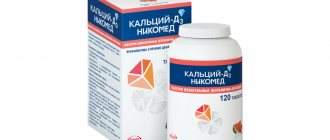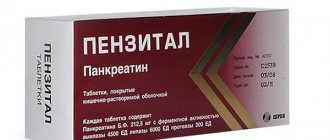Atenolol
Monitoring of patients taking Atenolol should include monitoring heart rate and blood pressure (at the beginning of treatment - daily, then once every 3-4 months), blood glucose concentration in patients with diabetes mellitus (once every 4-5 months). In elderly patients, it is recommended to monitor renal function (once every 4-5 months).
The patient should be taught how to calculate heart rate and instructed about the need for medical consultation if the heart rate is less than 50 beats/min.
In thyrotoxicosis, Atenolol may mask certain clinical signs of hyperthyroidism (for example, tachycardia). Abrupt withdrawal in patients with thyrotoxicosis is contraindicated because it can increase symptoms. Unlike non-selective beta-blockers, it practically does not enhance insulin-induced hypoglycemia and does not delay the restoration of blood glucose concentrations to normal levels.
In patients with coronary heart disease (CHD), abrupt withdrawal of beta-blockers may cause an increase in the frequency or severity of anginal attacks, so discontinuation of Atenolol in patients with CHD should be done gradually.
Particular attention also requires the selection of doses in patients with cardiac decompensation. Compared to non-selective beta-blockers, cardioselective beta-blockers have less effect on pulmonary function; however, in obstructive airway diseases, Atenolol should be prescribed only when absolutely indicated. If it is necessary to prescribe them, in some cases the use of beta2-adrenergic agonists can be recommended.
Patients with bronchospastic diseases can be prescribed cardioselective adrenergic blockers in case of intolerance and/or ineffectiveness of other antihypertensive drugs, but the dosage should be strictly monitored. An overdose is dangerous due to the development of bronchospasm.
Particular attention is necessary if surgical intervention under anesthesia is required in patients taking Atenolol. The drug should be stopped 48 hours before surgery. As an anesthetic, you should choose a drug with as little negative inotropic effect as possible.
When using Atenolol and clonidine simultaneously, Atenolol should be stopped several days before clonidine in order to avoid withdrawal syndrome from the latter.
It is possible that the severity of the hypersensitivity reaction may increase and the absence of effect from usual doses of epinephrine against the background of a burdened allergic history.
Drugs that reduce catecholamine reserves (for example, reserpine) may enhance the effect of beta-blockers, so patients taking such combinations of drugs should be under constant medical supervision to detect arterial hypotension or bradycardia.
In case of severe bradycardia (less than 50 beats/min), arterial hypotension (systolic blood pressure below 100 mm Hg), atrioventricular block, bronchospasm, ventricular arrhythmias, severe liver and kidney dysfunction in elderly patients, it is necessary to reduce the dose or stop treatment.
It is recommended to discontinue therapy if depression caused by taking beta-blockers develops.
If intravenous administration of verapamil is necessary, this should be done at least 48 hours after taking Atenolol.
When using Atenolol, it is possible to reduce the production of tear fluid, which is important for patients who use contact lenses.
Treatment should not be abruptly interrupted due to the risk of developing severe arrhythmias and myocardial infarction. Cancellation is carried out gradually, reducing the dose over 2 weeks or more (reduce the dose by 25% in 3-4 days).
The drug should be discontinued before testing the content of catecholamines, normetanephrine and vanillylmandelic acid in the blood and urine; antinuclear antibody titers.
Beta blockers are less effective in smokers.
Matters of the heart: how to replace Japanese atenolol
One of the most popular drugs for heart patients will no longer be sold in Russia. The Japanese company Takeda is stopping supplies of the drug atenolol, and along with it two more items from the list of vitally important drugs. The manufacturer states that this is a commercial decision related to a change in the product line. Cardiologists advise patients not to worry: the recalled drugs have better analogues, including those made in Russia. Vesti FM columnist Valery Emelyanov will continue the topic.
In Russia, Atenolol Nycomed will disappear from sale. This is an imported prescription drug for people with arrhythmia. It is so popular that among its analogues it accounts for more than half of the sales volume. Atenolol is considered one of the most affordable drugs. The Russian version costs 15-20 rubles per package, the foreign one - no more than 40. In a number of pharmacies, imported atenolol is no longer sold, but there are no problems with domestic ones - they are on sale, and in large quantities. The leading pharmacist of the Dalkhimpharm pharmacy chain, Irina Bulygina, comments on the situation.
BULYGINA: A lot of Russian manufacturers produce atenolol, amitriptyline and metronidazole. You can’t imagine what a fight is going on between Russian manufacturers to supply these medicines, and the price is very, very low. Metronidazole, for example, can be found in tablets even for 10 rubles. I think that the Japanese company simply cannot compete with our manufacturers.
Takeda, the company that owns the brand (the production itself is located in Germany and Denmark), stated that it would simply stop sales and will switch to other drugs. The issue of price could indeed play a key role. This is a vital drug, it has a fixed cost, and it has not changed for many years. Most likely, sales of atenolol no longer cover the costs, that is, it is not possible to make money on it, although it is indeed very popular, says DSM Group CEO Sergei Shulyak.
SHULYAK: Over the past year, the Russian pharmaceutical market showed the smallest growth in the last 20 years - 2.2%, which disheartens many pharmaceutical companies, especially considering that half of the Russian market is drugs included in the list of vitally important drugs and their prices regulated. Most likely, the restructuring affected the least profitable drugs.
People suffering from arrhythmia write that they almost always take imported atenolol, because this is what their doctors usually prescribe. According to experts, this is not only the merit of the manufacturer (the quality of the drug is beyond doubt), but also a purely advertising effect. Distributors at one time actively promoted foreign atenolol in clinics. And although now it is already morally outdated, doctors, by inertia, prescribe what they know well, explains Alexander Myasnikov, chief physician of City Clinical Hospital No. 71.
MYASNIKOV: The fact that it occupies such a large share in its niche has more to do with aggressive marketing and the reluctance of doctors to use other beta blockers more widely. This is not the most advanced beta blocker. It has its advantages, but it is fairly easy to replace. The arsenal of beta blockers today is large, and there are more and more of them. Dozens of drugs. It’s just that in our usual consciousness, atenolol is something that is always routinely prescribed.
Not all foreign pharmaceutical companies leave the Russian market without a scandal. Recently, Roszdravnadzor ordered the withdrawal from sale of the cough medicine Erespal, which was found to have a dangerous side effect: it can disrupt the heart rhythm. Just a couple of days later, it became known about problems with another imported medicine - Nifedipine, prescribed for hypertensive patients. He discovered an even more terrible defect - if the dose is exceeded, it can cause cardiac arrest. In both cases, the drugs were sold en masse around the world for years without any complaints.
However, the withdrawal itself may harm those for whom the drug was fully suitable, even if analogues are considered safer. There is a special procedure for such cases. The old medicine, of course, will not be returned to sale, but a replacement should be selected more carefully, says Igor Tsikorin, co-chairman of the Council of Public Organizations for the Protection of Patients' Rights.
CICORIN: A patient who is accustomed to receiving a specific drug experiences stress and assumes in advance that the new one will be worse. And if suddenly the replaced drug actually causes some side effects, then you need to contact your doctor, draw up a report on side effects and send it to Roszdravnadzor to investigate whether it was individual intolerance or poor quality of the drug.
If a side effect appears, although it was not stated in the instructions, then you can go to court. But strictly to the company that is indicated on the packaging of the medicine as its manufacturer (and not to the one that deprived you of your usual medicine). Situations when drugs that have been proven over the years are suddenly removed from the market occur quite often. This is usually due to financial problems of manufacturers. At best, as the Japanese did, they simply admit that they can no longer sell at current prices, and claims cannot be brought against them.
But many companies try to save on costs and thereby pose a threat to the health of patients. For example, they may change suppliers of ingredients for a drug from more expensive to cheaper ones. Or they will relocate production from more prosperous countries to states in less prosperous ones, where personnel costs are lower and supervisory requirements are weaker. And up to a certain point, patients may not even know that in fact they have been taking completely different medications for a long time. And when this becomes clear, and it is proven that real harm to health has been caused, only then can you go to court and demand compensation.
Buy Atenolol-Teva tablets 50 mg No. 30 in pharmacies
Atenolol Buy Atenolol in pharmacies
DOSAGE FORMS tablets 50mg film-coated tablets 50g film-coated tablets 50mg
GROUP Beta1-blockers (cardioselective)
COMPOSITION Active substance - Atenolol.
INTERNATIONAL NON-PROPENTED NAME Atenolol
SYNONYMS Atenobene, Atenova, Atenol, Atenolol Belupo, Atenolol Nycomed, Atenolol FPO, Atenolol-Agio, Atenolol-AKOS, Atenolol-Acri, Atenolol-Teva, Atenolol-UBF, Atenosan, Atcardil, Betacard, Betacard-100, Betacard-50, Vascoten, Prinorm, Tenolol, Tenormin, Hypoten
PHARMACOLOGICAL ACTION Hypotensive, antianginal, antiarrhythmic. Reduces heart rate (HR) both at rest and during physical activity. The negative chronotropic effect appears after 1 hour, reaches a maximum after 2-4 hours and continues for up to 24 hours. Reduces cardiac output, systolic blood pressure and diastolic blood pressure, reduces orthostatic tachycardia. The antihypertensive effect lasts 24 hours. Reduces myocardial oxygen demand. Increases survival of patients who have had myocardial infarction (reduces the frequency of ventricular arrhythmias and angina attacks). Slightly reduces the vital function of the lungs, practically does not weaken the bronchodilatory effect of isoproterenol. It penetrates poorly through the blood-brain barrier, passes through the placental barrier and into breast milk. It is practically not metabolized in the liver and is excreted by the kidneys through glomerular filtration.
INDICATIONS FOR USE Arterial hypertension, angina pectoris, acute myocardial infarction (with stable hemodynamic parameters), tachycardia: sinus, atrial, ventricular, paroxysmal, etc., extrasystole, atrial flutter and fibrillation, hyperkinetic cardiac syndrome, mitral valve prolapse, neurocirculatory dystonia due to hypertensive type; complex therapy of hypertrophic cardiomyopathy, pheochromocytoma, thyrotoxicosis, essential tremor; migraine (prevention).
CONTRAINDICATIONS Hypersensitivity, sinus bradycardia (heart rate less than 50 beats/min), sinoatrial block, sick sinus syndrome, AV block II-III degree, arterial hypotension (systolic blood pressure less than 90 mm Hg), acute or chronic cardiac failure in the stage of decompensation, cardiogenic shock, peripheral circulatory disorders, breastfeeding.
SIDE EFFECTS From the nervous system and sensory organs: increased fatigue, weakness, dizziness, headache, drowsiness or insomnia, nightmares, depression, anxiety, confusion or short-term memory loss, hallucinations, decreased reactivity, paresthesia, convulsions; blurred vision, decreased secretion of saliva and tear fluid, conjunctivitis. From the cardiovascular system and blood (hematopoiesis, hemostasis): bradycardia, palpitations, myocardial conduction disturbances, AV block, arrhythmias, weakened myocardial contractility, heart failure, hypotension, syncope, Raynaud's phenomenon, vasculitis, chest pain, thrombocytopenia, agranulocytosis . From the gastrointestinal tract: dry mouth, nausea, vomiting, abdominal pain, diarrhea, constipation, liver dysfunction. From the respiratory system: shortness of breath, laryngo- and bronchospasm. Allergic reactions: itching, rash, erythema, urticaria, psoriasis-like and dystrophic skin changes. Other: reversible alopecia, hyperhidrosis, cold extremities, myasthenia gravis, decreased libido, impotence, Peyronie's disease, changes in enzyme activity, bilirubin levels, withdrawal syndrome, hypothyroid state, hypoglycemia.
INTERACTION Antiarrhythmic and anesthetic drugs enhance the cardiodepressive effect (increases the risk of developing bradycardia, arrhythmia, hypotension, heart failure). Reserpine, alpha-methyldopa, clonidine, guanfacine, cardiac glycosides potentiate the negative chrono-, dromo- and bathmotropic effect, insulin and other antidiabetic drugs - hypoglycemia. NSAIDs, estrogens, sympathomimetics, xanthines weaken the hypotensive effect, absorption, increase - sympatholytics, nitroglycerin, apressin and other antihypertensive drugs, antacids - slow down absorption. Cimetidine inhibits metabolism. Prolongs the effect of antidepolarizing muscle relaxants, the anticoagulant effect of coumarins. Tri/tetracyclic antidepressants, antipsychotics, sedatives, hypnotics and alcohol potentiate CNS depression. Incompatible with MAO inhibitors.
METHOD OF APPLICATION AND DOSAGE Orally, before meals, without chewing and with a small amount of liquid. The dosage regimen is set individually. For arterial hypertension - 25-50 mg once, if necessary, 100-200 mg 1-2 times a day. For coronary heart disease, tachysystolic heart rhythm disturbances - 50 mg 1 time per day; if necessary and well tolerated, the dose can be increased within a week to 100-200 mg/day. In case of acute myocardial infarction with stable hemodynamic parameters - after 12 hours - again 50 mg; then - 50 mg 2 times a day for 6-9 days (under the control of blood pressure, ECG, glucose levels). For functional disorders of the cardiovascular system - 25 mg 1 time per day. In case of impaired renal function, depending on creatinine clearance: with a clearance of 15-35 ml/min - 50 mg/day (or 100 mg every other day), less than 15 ml/min - 50 mg every second day (or 100 mg 1 time every 4 day); for patients on hemodialysis - 25-50 mg/day immediately after dialysis. In elderly patients, the initial single dose is 25 mg (can be increased under the control of blood pressure and heart rate).
OVERDOSE Symptoms: bradycardia, AV block II-III degree, heart failure, respiratory failure, hypotension, bronchospasm, hypoglycemia. Treatment: gastric lavage and administration of adsorbents; symptomatic therapy: atropine, isoprenaline, orciprenaline, cardiac glycosides or glucagon, diuretics, vasopressors (dopamine, dobutamine or norepinephrine), selective beta-agonists, glucose solution (iv), installation of an artificial pacemaker. Dialysis is possible.
SPECIAL INSTRUCTIONS Restricted for use in: diabetes mellitus, hypoglycemia, chronic obstructive pulmonary diseases (emphysema, bronchial asthma), liver and/or kidney dysfunction, myasthenia gravis, depression, psoriasis, pheochromocytoma, metabolic acidosis, pregnancy, children (efficacy and safety not determined) and old age. Use during pregnancy and breastfeeding: Possible if the expected effect of therapy exceeds the potential risk to the fetus. Breastfeeding should be stopped during treatment. Treatment is carried out with regular medical supervision. Before starting therapy, heart failure should be compensated. During treatment, monitoring of heart rate, blood pressure, blood glucose levels is necessary (dosage adjustment of antidiabetic drugs is possible) and monitoring for the appearance of symptoms of heart failure. Use with caution while working for vehicle drivers and people whose profession involves increased concentration. It is recommended to avoid alcohol intake during therapy. For more detailed information, see the instructions for use.
STORAGE CONDITIONS List B. In a place protected from light, at room temperature no higher than 25 degrees. WITH



